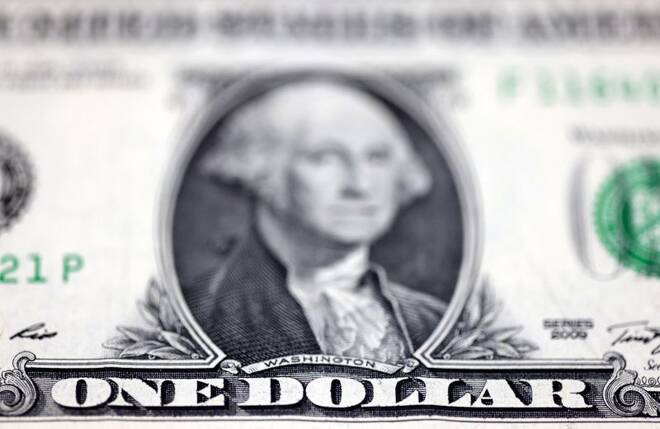Advertisement
Advertisement
Dollar falls for third straight session with Fed eyed
By:
By Tom Westbrook SINGAPORE (Reuters) - The dollar was on a firm footing on Monday, as traders brace for a sharp U.S. interest rate hike this week and look for safety as data points to a weakening global economy.
By Chuck Mikolajczak
NEW YORK (Reuters) – The dollar was lower against a basket of major currencies on Monday, as investors weighed the implications of a rate hike by the U.S. Federal Reserve in an economy that may be on the verge of a recession.
The central bank is widely expected to raise interest rates by 75 basis points at the conclusion of its policy meeting on Wednesday. A hike of that magnitude would effectively close out pandemic-era support for the economy.
Expectations for a hike of 75 basis points from the Fed stand at about 75%, according to CME’s Fedwatch Tool with a 25% chance of a 100 basis point hike.
Recent data has shown signs of an economic slowdown while inflation remains stubbornly high, with claims for jobless benefits rising to its highest in eight months last week and regional manufacturing gauges slumping.
Later in the week, investors will also eye the advance reading for second-quarter gross domestic product, which could show negative growth and meet a traditional definition of recession. On Friday, personal consumption expenditures, the Fed’s preferred inflation measure, will be released.
“Everybody is expecting a 75 percent increase, a recession essentially the day after with a negative GDP so I don’t think you are going to get anything changing right now,” said Joseph Trevisani, senior analyst at FXStreet.com.
“But right now, equities are going nowhere, the dollar has remained strong but has given back, the traders who went long the dollar took some profits which is perfectly normal.”
The dollar index fell 0.244% at 106.420, with the euro up 0.14% to $1.0224.
Last week, the greenback saw its biggest weekly percentage decline in two months, as a rally in equities helped dent the appeal of the safe-haven dollar and a 50 basis point rate hike by the European Central Bank helped buoy the euro to a two-week high.
On Monday, Latvian central bank Governor Martins Kazaks said in an interview with Bloomberg News that the ECB may not be done with big rate hikes.
U.S. equities gave up early gains with a slew of corporate earnings on deck for the week, including those from mega-cap names such as Apple, MicrosoftMSFT.O> and AmazonAMZN.O>. Investors are eyeing the earnings season for signs of a slowdown in the economy as well as the impact of a strong dollar on profits.
Of the 107 companies in the S&P 500 that have reported earnings through Monday morning, 74.8% have topped analyst expectations, below the 81% beat rate over the past four quarters, but above the 66% rate since 1994, per Refinitiv data. Earnings growth is currently estimated to be 6.1%, up from 5.6% at the start of July.
The Ifo business sentiment survey showed on Monday that business morale in Germany fell more than expected in July to its lowest in more than two years.
The Japanese yen weakened 0.44% versus the greenback at 136.65 per dollar, while Sterling was last trading at $1.2047, up 0.37% on the day.
British industrial output grew at the slowest pace in over a year in the three months to July, but there are tentative signs that some challenges around inflation and investment are easing, a Confederation of British Industry survey showed on Monday.
In cryptocurrencies, bitcoin last fell 4.05% to $21,687.61.
(Reporting by Chuck Mikolajczak, editing by Ed Osmond and Marguerita Choy)
About the Author
Reuterscontributor
Reuters, the news and media division of Thomson Reuters, is the world’s largest international multimedia news provider reaching more than one billion people every day. Reuters provides trusted business, financial, national, and international news to professionals via Thomson Reuters desktops, the world's media organizations, and directly to consumers at Reuters.com and via Reuters TV. Learn more about Thomson Reuters products:
Advertisement
